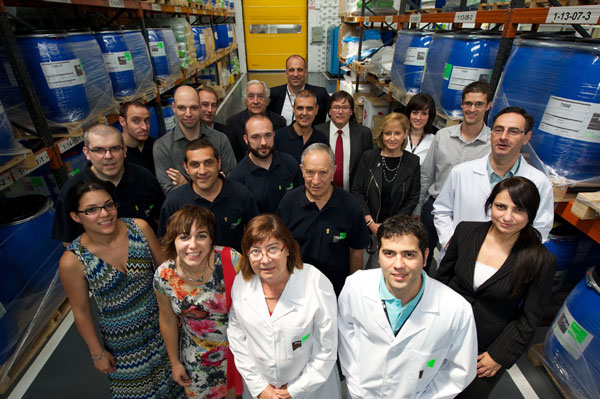Pujadas marks 125 years in business.
By Stephanie Banfield
Pujadas of Barcelona, Spain, is celebrating its 125th anniversary this year, marking a major milestone for the family-owned business that has experienced a series of ups and downs throughout the decades and is currently enjoying considerable success in a highly competitive industry.
Pujadas’ roots can be traced to 1890, when Domingo Pujadas i Amigo founded a business with a focus on marketing chemicals for the textile industry. Twenty-five years later, the company had expanded its scope and extended its activities to include the manufacture of adhesives, sulfonated oils, softeners and auxiliaries for the textile, tanning and papermaking industries. By 1917, Domingo Pujadas i Amigo—a man well-known for his entrepreneurial spirit—became a founding member of the American Chamber of Commerce in Spain, where he worked to promote and develop new international alliances.

When Europe entered World War I, a wide array of raw materials was needed in order to supply and sustain the ongoing warfare, requiring Domingo Pujadas i Amigo to offer the support of his chemistry solutions to numerous European companies during the war. Following the social and political strife of World War I, as well as the passing of Domingo Pujadas i Amigo, his nephew, Josep M. Pujadas Badia, continued the family tradition and took control of the company in 1924. With Badia at the wheel, the second generation of the business was born, and the company began to expand its post-war activities—namely extending its business to the manufacture of sulfonate oils, softeners and auxiliaries for both the tanning and papermaking industries.
Though Pujadas had begun experiencing success manufacturing products for use in various industries, the company soon found itself face to face with two significant hurdles: the Spanish Civil War, from 1936–1939, and World War II, which lasted from 1939–1945. Because Spain was placed under a closed dictatorship system from that point on, the third generation of the family-owned company was forced to primarily develop the business from the Iberian Peninsula. Brothers Josep M. Pujadas i Calzada and Domingo Pujadas i Calzada greatly expanded the company’s manufacturing initiatives, and Pujadas soon had a presence within the food and beverage labeling industry—a significant new activity to add to the company’s growing portfolio.

In 1960, under Josep Pujadas Domingo—the fourth generation to take a leadership position in the family business—the company made its foray into the tobacco industry, manufacturing industrial adhesives for cigarettes, and six years later, construction of a new 1,300-square meter plant in Barcelona began. In 1970, the company’s export activity was well underway, with Pujadas supplying industrial adhesives throughout Europe, the Middle East and Africa, and another new plant and laboratory was constructed in 1980. With a decades-long dictatorship coming to a close, and the start of the transition to a democratic system beginning in Spain, the company sought to initiate a second stage in its international endeavors.
In the 1980s, a new location with the capacity to produce 14,000 tons of product per year was constructed, giving Pujadas the ability to develop its production capacities and further expand its international presence. And in 1990—the year that marked Pujadas’ 100th anniversary—the doors to a series of new offices on the 12,000-square-meter premises that house that plant and laboratory were opened.
At the turn of the 21st century, Pujadas’ international presence blossomed into global expansion within the tobacco industry. Led first by Raimon Pujadas Uriach and currently by Marc Subias Pujadas, the fifth generation to run the company focused on the development of the business with multinational cigarette companies. Today, Pujadas is present in more than 35 countries and has started its expansion in new areas, including Southeast Asia and America. With a focus on innovative formulations and best international manufacturing practices, Pujadas currently plays a significant role within multinationals’ supply chain networks.
Pujadas’ development in the cigarette industry is opening the adhesives category, offering to the cigarette industry new alternatives and a long-term competitive category, providing the industry with significant new options and innovative solutions. With more than 55 years of experience in the industry, homologated at all the multinationals, working also for significant independent cigarette companies and daily partnering with major OEMs, the company is promoting a more balanced adhesive category, in mutual interest of all the agents of the tobacco industry.
 The company also prides itself on diversifying its product offerings as well as formulating and distributing “green” and healthy chemical specialties with a focus on reducing energy consumption and increasing environmental efficiency during the production and manufacturing phases.
The company also prides itself on diversifying its product offerings as well as formulating and distributing “green” and healthy chemical specialties with a focus on reducing energy consumption and increasing environmental efficiency during the production and manufacturing phases.
After obtaining ISO 14001 and OSHAS 18001 certification in 2010, Pujadas set out to analyze and control its carbon footprint, reduce emissions and improve its waste management initiatives.
Keeping a close eye on the environmental impacts of manufacturing adhesives for the past half-decade, the company now boasts a greener product range that includes sustainable raw materials and glues that are based only on ingredients that can be classified as completely natural.
With 125 years of experience under its belt, Pujadas is well-positioned to offer innovative new alternatives to the adhesives used in traditional cigarettes and to infuse a breath of fresh air into an industry that has begun to demand “green” adhesives derived from natural and sustainable sources. As the company celebrates its 125th year of operations, Pujadas continues to keep a close eye on the environmental impacts of the development of its products while striving to be recognized as a world-renowned global adhesives company that provides exceptional formulations and chemical solutions for not only the cigarette industry but also an assortment of additional industrial sectors for another century to come.












